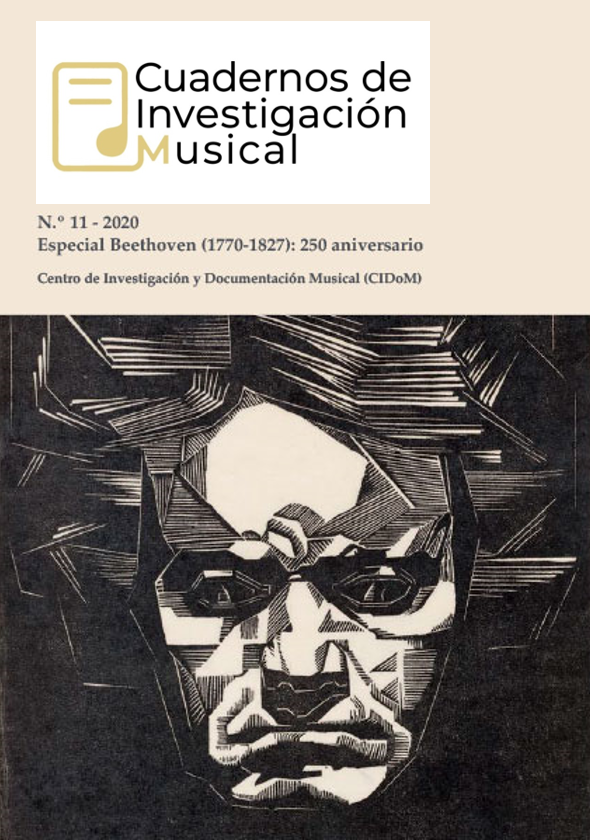Romantic Spain and an exceptional music score. Coriolano by Francisco Andreví
Main Article Content
Abstract
When the 250th anniversary of the birth of the immeasurable Ludwig van Beethoven, author of a famous Coriolan Overture, Op. 62 in C minor (Ouvertüre zu Coriolan) is celebrated, the opportunity has been raised to publicize the work here, of the same name, written by Francisco Andreví (*1786; †1853), who was master of the Spanish Royal Chapel between 1830 and 1836, that is, with the Bourbon king Ferdinand vii of Spain, and during the first years of the regency of Maria Christina of the Two Sicilies. A composer later released in Bordeaux and Paris, this is the only work by this Catalan musician known today for the scene, which has been preserved in a single handwritten copy. A music, without a doubt, conditioned by the complex political situation of the moment in the Spanish court, which reveals the lights and shadows of a type of composition “of circumstances” and “of consumption”, steeped in Italian operatic literature at the time in vogue ―and because of its reflection in France― (Rossini, Auber, Meyerbeer), here very second-rate, although with brief flashes, sometimes brilliant, although above all and mainly shocking, which are only a testimony, striking, and perhaps paradigmatic, of what could have been and what it ended up becoming, the music of a nation in full dismantling. See here the score edition of the aforementioned composition, which is accompanied by an extensive study, to which reference is made.
Article Details
Los autores de los artículos mantienen el copyright, no recibirán ninguna contraprestación económica por el trabajo y el mismo siempre será reconocido como exclusivamente suyo. La revista se compromete a proteger la integridad y originalidad del artículo, así como los derechos de autor que correspondan. Los autores son los únicos responsables del material, textos e imágenes que utilizan en sus respectivos trabajos, debiendo respetar siempre los derechos de autor de terceras personas, por lo que la revista no se hace responsable de lo contenido en este tema respecto al trabajo de los autores.
References
Ballús Casòliva, G. & Ezquerro Esteban, A. (2016). Música en imágenes. Francisco Andreví (1786-1853). Músico de Iglesia y compositor cosmopolita en un mundo cambiante. Madrid: Alpuerto.
Ballús Casòliva, G. & Ezquerro Esteban, A. (2019a). Francisco Andreví (*1786; †1853) entre Francia y España: composición musical e implicaciones sociales en la primera mitad del siglo XIX. Parte I. Una trayectoria en ascenso: del Pirineo hacia el Sur. Desde La Seu d’Urgell a la Real Capilla. Cuadernos de Investigación Musical, (7), pp. 3-48.
Ballús Casòliva, G. & Ezquerro Esteban, A. (2019b). Francisco Andreví (*1786; †1853) entre Francia y España: composición musical e implicaciones sociales en la primera mitad del siglo XIX. Parte II. A ambos lados del Pirineo. Burdeos, París y Barcelona. Cuadernos de Investigación Musical, (8), pp. 77-114.
Ezquerro Esteban, A. (2020). Otro «Coriolano». La «Escena y Aria con coros, con acompañamiento de piano» de Francisco Andreví, Maestro de la Real Capilla española (1830-1836). En P. Capedpón Verdú & J. J. Pastor Comín (Eds.). Beethoven desde España. Estudios interdisciplinares y recepción musical (en prensa). Valencia: Tirant lo Blanch.
